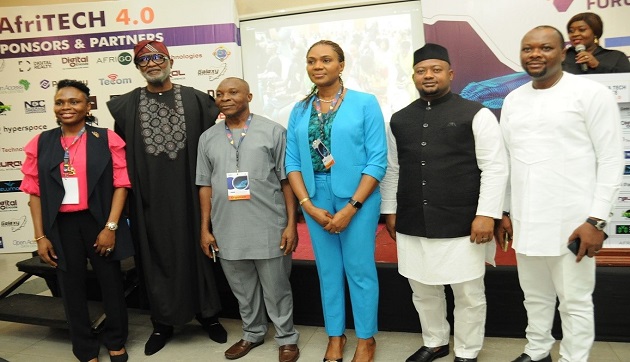Africa’s potential to become a global technology leader took centre stage at the Africa Tech Alliance Forum (AfriTECH 4.0) in Lagos, Nigeria. Themed “Harnessing Fintech Solutions for Financial Inclusion & eCommerce Growth,” the event showcased the transformative role of blockchain, artificial intelligence (AI), and digital infrastructure in advancing Africa’s digital economy.
Kashifu Inuwa Abdullahi, Director-General of the National Information Technology Development Agency (NITDA), in his keynote address titled “Blockchain Technology & AI: Positioning Africa for the Future,” highlighted Africa’s unique position to leverage emerging technologies.
Read also: NITDA releases guidelines on protecting WhatsApp accounts from hackers
Represented by Mrs Rita Shoremi, Head of Startup Innovations and IT Solutions, NITDA South West Zone, Mr Abdullahi said, “Both blockchain and artificial intelligence are powerful technologies that offer Africa unprecedented opportunities. By strategically integrating these technologies, we can propel Africa forward as a dynamic leader in the global digital economy.”
Mr Abdullahi further noted that Africa is ripe for digital transformation, with mobile penetration reaching 80 percent and over 60 percent of the continent’s population under age 25. He emphasised blockchain’s ability to address financial inclusion, governance, and property rights, estimating that the technology could add $300 billion to Africa’s GDP by 2025.
Tackling challenges in the digital economy
Dr Obadare Peter Adewale, Chief Visionary Officer of Digital Encode Limited, explored the intersection of blockchain, AI, cryptocurrency, and cybersecurity. Represented by Oluwakayode Olatunji, Group Head of Information Security, Adewale warned that while these technologies are transformative, they also introduce risks such as cyberattacks and data breaches. “A robust cybersecurity framework is crucial for sustainable digital transformation,” he cautioned, urging stakeholders to prioritise security as they adopt emerging technologies.
Financial inclusion was another primary focus of the forum. Mr Biram Fall, Regional General Manager of QNET Sub-Saharan Africa, noted that with over 350 million unbanked adults, Africa’s digital solutions have significant potential. Fall emphasised the importance of initiatives like QNET’s “Fit Green” financial literacy program, which has trained over 1,500 young Nigerians and fosters entrepreneurship and economic independence through e-commerce-driven models.
“The demand for financial inclusion aligns with a projected $75 billion e-commerce market in Africa by 2025, driven by rising internet access and smartphone adoption,” Fall added.
Read also: Lagos launches second phase of digital skills training, targets one million youths by 2030
Building sustainable digital infrastructure
Prof Ibrahim Adeyanju, Managing Director of Galaxy Backbone, stressed the need for a robust infrastructure to support Africa’s digital ambitions. Represented by Mr Nnamdi Onoh, Field Service Engineer, Mr Adeyanju stated, “Africa’s digital journey presents immense opportunities, but it requires robust, scalable, and sustainable infrastructure to enable economic growth.”
Galaxy Backbone’s investments in state-of-the-art data centres, fibre optic networks, and secure cloud solutions create a digital backbone supporting government services and businesses across Nigeria.
Mrs Ebehijie Momoh, CEO of AfriGoPay Financial Services Limited, highlighted Nigeria’s rapid progress in financial inclusion, with the rate rising to 64 percent in 2023. “The advent of domestic payment solutions like the AfriGo card reduces costs by processing transactions in local currency, thereby supporting the nation’s financial inclusion goals,” she noted.
















